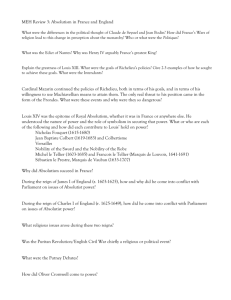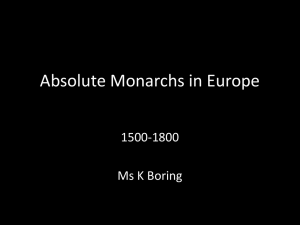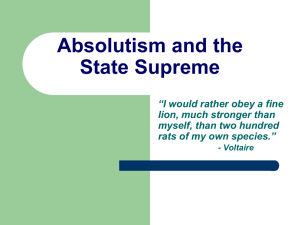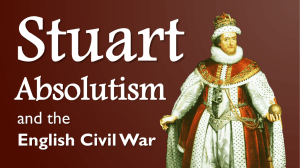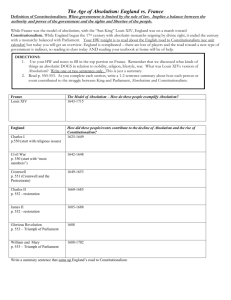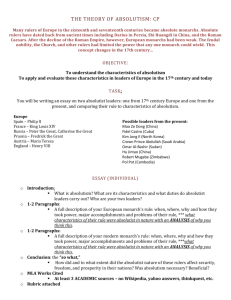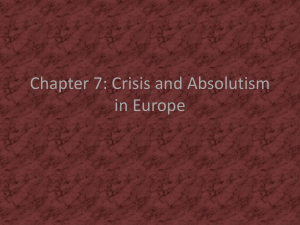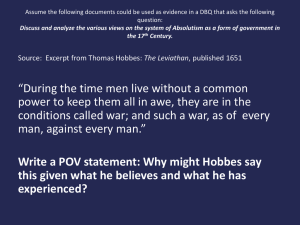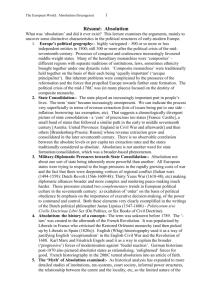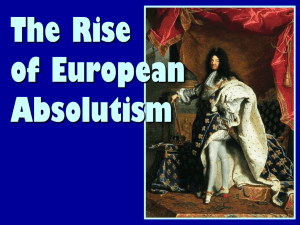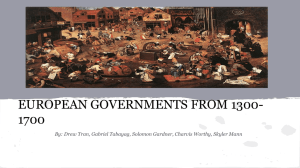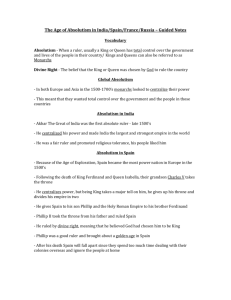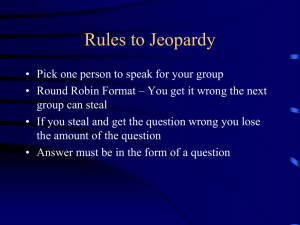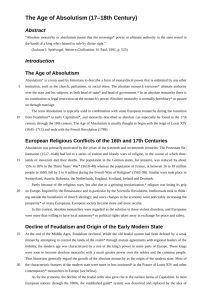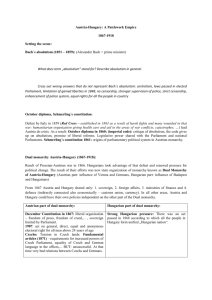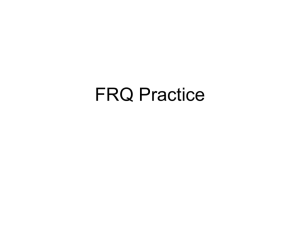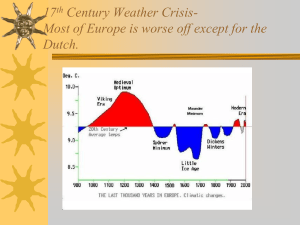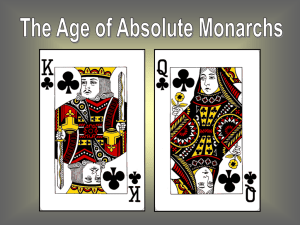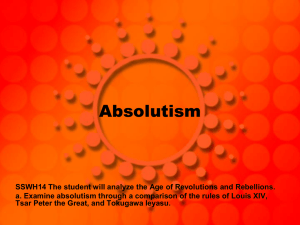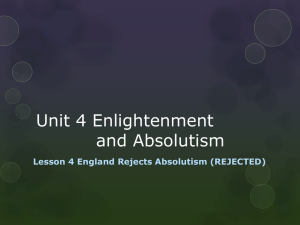Absolutism and State Building in Europe, 1618-1715
advertisement
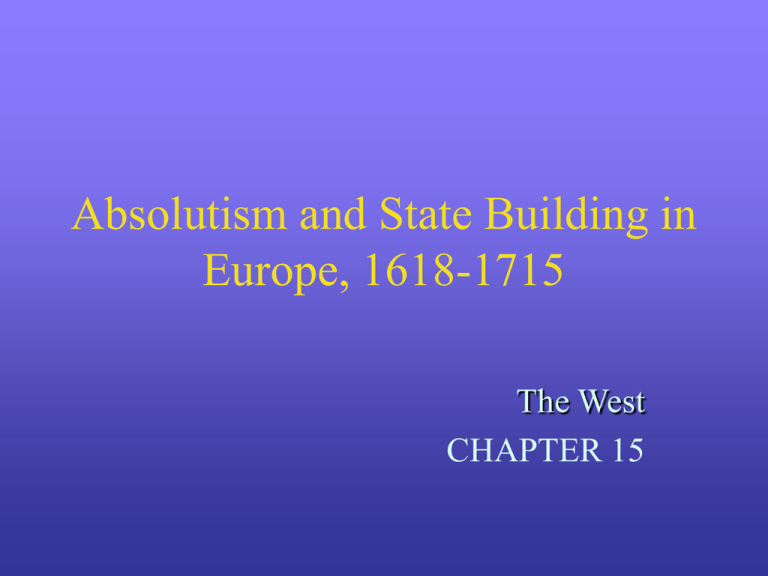
Absolutism and State Building in Europe, 1618-1715 The West CHAPTER 15 The Theory of Absolutism • Monarchs possessed the power to make laws by themselves, without legislatures • A monarch was accountable only to God, not to his or her subjects • A monarch was not bound by the laws of the state, but was obliged to observe them • Obligation to rule of law defined western absolutism The Practice of Absolutism • Elimination or subordination of national assemblies and legislatures • Cultivation of regional and municipal support • Subordination of nobility to royal will and favor • Establishment of effective, centralized administrative control Warfare and the Absolutist State • State of almost continual warfare in Europe, between 1600 and 1721 • Establishment of large, standing armies • Application of new military tactics and technologies • Intensification of military training • Expansion of taxation and bureaucracy to support and manage new armies The Foundations of French Absolutism • Began as a response to the turmoil of the Wars of Religion • Cardinal Richelieu restricted the power of regional assemblies, strengthened central administration of the state, disarmed the Protestant minority, and increased taxation • The Fronde, 1648-1653, revealed the continuing strength of resistance to absolutist government Absolutism in the Reign of Louis XIV • Projected an image of incomparable majesty • Secured the loyalty and dependence of the nobility • Perfected Richelieu’s policy of administrative centralization • Increased tax revenues, and encouraged and protected French industry • Enforced religious conformity Louis XIV and the Culture of Absolutism • Influenced and controlled the creation and dissemination of cultural products • Patronized and encouraged cultural institutions • Transformed public life, by seeking order and uniformity in all matters • French culture became the dominant influence in European high society The Wars of Louis XIV, 16671714 • Financial and military reforms created a formidable military machine • Fought wars to acquire new territory • Only an alliance of almost all the other European powers was able to counter the French military • Treaty of Ryswick, 1697, established the principle of a balance of powers Absolutism and State Building in Spain • Period of economic, political and military decline • Attempt at absolutist reforms • Failed to subdue regional and aristocratic autonomy and influence • Ineffectual economic reforms failed to increase taxation or encourage industry Germany and the Thirty Years’ War, 1618-1648 • Thirty Years’ War began as a religious and constitutional struggle within the empire • Demographic and economic devastation of Germany • Weakened the institution of the empire permanently • Individual German territories developed into sovereign states -Prussia and Austria became major European powers The Ottoman Empire: Between East and West • Western Europeans considered the Ottoman empire to be “oriental” and despotic • Deep cultural divide between the Ottoman Empire (East) and the West • Ottoman power declined through the seventeenth century • Network of diplomatic, commercial and cultural contacts between the Turks and the West Russia and the West • Until the seventeenth century, Russia was considered more Asian than European • Peter I (r. 1682-1725) initiated a process of cultural, political and military reform, modeled on Western ideas • Built a westernized military state • Construction of St. Petersburg symbolized Russia’s new engagement with Europe The English Monarchy and the Civil War • Institution and culture of the English Parliament were antithetical to absolutism • Attempt by Charles I (r. 1625-1649) to rule as an absolute monarch led to religious and constitutional conflicts with parliament • English Civil War, 1642-1649, ended in victory for Parliament - execution of Charles I and abolition of the monarchy Revolution and Restoration in England • Republic established after 1649 faltered on constitutional and religious issues • The restored monarchy attempted to subvert parliament by packing it with royalists • James II (r. 1685-1688) attempted to grant toleration and political power to Catholics • “Glorious Revolution” deposed James II, in favor of William of Orange and Mary Stuart William III and Parliamentary Supremacy • The Declaration of Rights became the cornerstone of the English constitution; • Guaranteed the role of parliament in government • Royal veto of legislation was exercised for the last time, in 1707 • Expansion of the power of the state prompted by military pressures and supported by parliament The Dutch Republic • Remained a loose confederation of sovereign republics • Political power held by urban merchants and rural nobles • Highly commercial economy fueled the acquisition of colonial possessions • Fostered religious toleration and artistic creativity - the Dutch Golden Age The Western State, in the Age of Absolutism • Dramatic expansion of the state increasingly centralized and cohesive • Introduction of royal absolutism • Development of new style of warfare • Emergence of concepts of international law and a balance of power
